Deck 12: Parametric Equations, Polar Coordinates, and Conic Sections
Question
Question
Question
Question
Question
Question
Question
Question
Question
Question
Question
Question
Question
Question
Question
Question
Question
Question
Question
Question
Question
Question
Question
Question
Question
Question
Question
Question
Question
Question
Question
Question
Question
Question
Question
Question
Question
Question
Question
Question
Question
Question
Question
Question
Question
Question
Question
Question
Question
Question
Question
Question
Question
Question
Question
Question
Question
Question
Question
Question
Question
Question
Question
Question
Question
Question
Question
Question
Question
Question
Question

Unlock Deck
Sign up to unlock the cards in this deck!
Unlock Deck
Unlock Deck
1/71
Play
Full screen (f)
Deck 12: Parametric Equations, Polar Coordinates, and Conic Sections
1
 is a parametrization of which curve?
is a parametrization of which curve?A)

B)

C)

D)

E) None of the above

2
Find parametric equations for the curve  .
.
 .
. , where
, where  (There are other possible answers.)
(There are other possible answers.) 3
Eliminate the parameter and write an equation in  and
and  for the parametric curve
for the parametric curve 
 and
and  for the parametric curve
for the parametric curve 

4
The right hyperbola  is parametrized by which of the following equations?
is parametrized by which of the following equations?
A)
B)
C)
D)
E)
 is parametrized by which of the following equations?
is parametrized by which of the following equations?A)

B)

C)

D)

E)


Unlock Deck
Unlock for access to all 71 flashcards in this deck.
Unlock Deck
k this deck
5
The slope of the curve  at
at  is which of the following?
is which of the following?
A)
B)
C)
D)
E)
 at
at  is which of the following?
is which of the following?A)

B)

C)

D)

E)


Unlock Deck
Unlock for access to all 71 flashcards in this deck.
Unlock Deck
k this deck
6
Find the area of the surface generated by revolving the curve  about the x-axis.
about the x-axis.
 about the x-axis.
about the x-axis.
Unlock Deck
Unlock for access to all 71 flashcards in this deck.
Unlock Deck
k this deck
7
The surface area  of the surface generated by revolving the parametric curve
of the surface generated by revolving the parametric curve  about the x-axis for
about the x-axis for  is given by the formula
is given by the formula  .
.
Compute the area of the surface generated by revolving the parametric curve about the x-axis.
about the x-axis.
 of the surface generated by revolving the parametric curve
of the surface generated by revolving the parametric curve  about the x-axis for
about the x-axis for  is given by the formula
is given by the formula  .
.Compute the area of the surface generated by revolving the parametric curve
 about the x-axis.
about the x-axis.
Unlock Deck
Unlock for access to all 71 flashcards in this deck.
Unlock Deck
k this deck
8
Find the speed and the length of the curve. 


Unlock Deck
Unlock for access to all 71 flashcards in this deck.
Unlock Deck
k this deck
9
Find the slope of the tangent line to the curve  at
at  .
.
 at
at  .
.
Unlock Deck
Unlock for access to all 71 flashcards in this deck.
Unlock Deck
k this deck
10
Find parametric equations for the curve  .
.
 .
.
Unlock Deck
Unlock for access to all 71 flashcards in this deck.
Unlock Deck
k this deck
11
Find the speed and arc length of  ,
,  .
.
 ,
,  .
.
Unlock Deck
Unlock for access to all 71 flashcards in this deck.
Unlock Deck
k this deck
12
Express the parametric curve by an equation in  and
and 

 and
and 


Unlock Deck
Unlock for access to all 71 flashcards in this deck.
Unlock Deck
k this deck
13
Find the equation of the tangent line to the parametric curve  at
at  .
.
 at
at  .
.
Unlock Deck
Unlock for access to all 71 flashcards in this deck.
Unlock Deck
k this deck
14
A moving particle is following the path  . At
. At  the particle leaves the path on a straight line tangent to the path. If the particle maintains the same speed as when it left the path, what are the x- and y-coordinates of the particle's position when
the particle leaves the path on a straight line tangent to the path. If the particle maintains the same speed as when it left the path, what are the x- and y-coordinates of the particle's position when  ?
?
 . At
. At  the particle leaves the path on a straight line tangent to the path. If the particle maintains the same speed as when it left the path, what are the x- and y-coordinates of the particle's position when
the particle leaves the path on a straight line tangent to the path. If the particle maintains the same speed as when it left the path, what are the x- and y-coordinates of the particle's position when  ?
?
Unlock Deck
Unlock for access to all 71 flashcards in this deck.
Unlock Deck
k this deck
15
A particle travels along the path  (where length is in feet and time is in minutes). Find the speed of the particle and compute its displacement and the distance covered during the first minute of its motion.
(where length is in feet and time is in minutes). Find the speed of the particle and compute its displacement and the distance covered during the first minute of its motion.
 (where length is in feet and time is in minutes). Find the speed of the particle and compute its displacement and the distance covered during the first minute of its motion.
(where length is in feet and time is in minutes). Find the speed of the particle and compute its displacement and the distance covered during the first minute of its motion.
Unlock Deck
Unlock for access to all 71 flashcards in this deck.
Unlock Deck
k this deck
16
Find parametric equations for the curve  .
.
 .
.
Unlock Deck
Unlock for access to all 71 flashcards in this deck.
Unlock Deck
k this deck
17
Calculate the area under the parametrized curve given by  for
for  .
.
 for
for  .
.
Unlock Deck
Unlock for access to all 71 flashcards in this deck.
Unlock Deck
k this deck
18
The slope of the curve  at
at  is which of the following?
is which of the following?
A)
B)
C)
D)
 at
at  is which of the following?
is which of the following?A)

B)

C)

D)


Unlock Deck
Unlock for access to all 71 flashcards in this deck.
Unlock Deck
k this deck
19
Find the speed and the length of the curve. 


Unlock Deck
Unlock for access to all 71 flashcards in this deck.
Unlock Deck
k this deck
20
Calculate the area under the parametrized curve given by  for
for  .
.
 for
for  .
.
Unlock Deck
Unlock for access to all 71 flashcards in this deck.
Unlock Deck
k this deck
21
Find the arc length of the parametric curve  for
for  .
.
 for
for  .
.
Unlock Deck
Unlock for access to all 71 flashcards in this deck.
Unlock Deck
k this deck
22
Write the equation of  in polar coordinates.
in polar coordinates.
 in polar coordinates.
in polar coordinates.
Unlock Deck
Unlock for access to all 71 flashcards in this deck.
Unlock Deck
k this deck
23
The surface area  of the surface generated by revolving a parametric curve
of the surface generated by revolving a parametric curve  about the x-axis for
about the x-axis for  is given by the formula
is given by the formula  .
.
Compute the area of the surface generated by revolving the curve ,
,  about the x-axis.
about the x-axis.
 of the surface generated by revolving a parametric curve
of the surface generated by revolving a parametric curve  about the x-axis for
about the x-axis for  is given by the formula
is given by the formula  .
.Compute the area of the surface generated by revolving the curve
 ,
,  about the x-axis.
about the x-axis.
Unlock Deck
Unlock for access to all 71 flashcards in this deck.
Unlock Deck
k this deck
24
Write the equation of  in polar coordinates.
in polar coordinates.
 in polar coordinates.
in polar coordinates.
Unlock Deck
Unlock for access to all 71 flashcards in this deck.
Unlock Deck
k this deck
25
Write the equation of  in Cartesian coordinates.
in Cartesian coordinates.
 in Cartesian coordinates.
in Cartesian coordinates.
Unlock Deck
Unlock for access to all 71 flashcards in this deck.
Unlock Deck
k this deck
26
The equation of  in Cartesian coordinates is which of the following?
in Cartesian coordinates is which of the following?
A)
B)
C)
D)
E) none of the above.
 in Cartesian coordinates is which of the following?
in Cartesian coordinates is which of the following?A)

B)

C)

D)

E) none of the above.

Unlock Deck
Unlock for access to all 71 flashcards in this deck.
Unlock Deck
k this deck
27
Write the equation  in rectangular coordinates.
in rectangular coordinates.
 in rectangular coordinates.
in rectangular coordinates.
Unlock Deck
Unlock for access to all 71 flashcards in this deck.
Unlock Deck
k this deck
28
Find the arc length of the curve given by the parametric equations 


Unlock Deck
Unlock for access to all 71 flashcards in this deck.
Unlock Deck
k this deck
29
Find the arc length of the parametric curve  .
.
 .
.
Unlock Deck
Unlock for access to all 71 flashcards in this deck.
Unlock Deck
k this deck
30
Find the polar equation of the line  .
.
 .
.
Unlock Deck
Unlock for access to all 71 flashcards in this deck.
Unlock Deck
k this deck
31
Find the speed at  and the arc length of the parametric curve
and the arc length of the parametric curve  between the points
between the points  (corresponding to
(corresponding to  ) and
) and  (corresponding to
(corresponding to  ).
).
 and the arc length of the parametric curve
and the arc length of the parametric curve  between the points
between the points  (corresponding to
(corresponding to  ) and
) and  (corresponding to
(corresponding to  ).
).
Unlock Deck
Unlock for access to all 71 flashcards in this deck.
Unlock Deck
k this deck
32
Find the polar equation of the line through  orthogonal to the line
orthogonal to the line  .
. 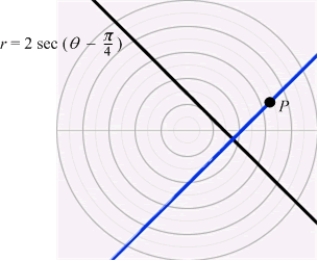
 orthogonal to the line
orthogonal to the line  .
. 

Unlock Deck
Unlock for access to all 71 flashcards in this deck.
Unlock Deck
k this deck
33
The surface area  of the surface generated by revolving a parametric curve
of the surface generated by revolving a parametric curve  about the x-axis for
about the x-axis for  is given by the formula
is given by the formula  .
.
Compute the area of the surface generated by revolving the curve about the x-axis.
about the x-axis.
 of the surface generated by revolving a parametric curve
of the surface generated by revolving a parametric curve  about the x-axis for
about the x-axis for  is given by the formula
is given by the formula  .
.Compute the area of the surface generated by revolving the curve
 about the x-axis.
about the x-axis.
Unlock Deck
Unlock for access to all 71 flashcards in this deck.
Unlock Deck
k this deck
34
Compute the length of the parametric curve  .
.
 .
.
Unlock Deck
Unlock for access to all 71 flashcards in this deck.
Unlock Deck
k this deck
35
The equation of  in Cartesian coordinates is which of the following?
in Cartesian coordinates is which of the following?
A)
B)
C)
D)
E)
 in Cartesian coordinates is which of the following?
in Cartesian coordinates is which of the following?A)

B)

C)

D)

E)


Unlock Deck
Unlock for access to all 71 flashcards in this deck.
Unlock Deck
k this deck
36
Find the arc length of the loop of the curve given by the parametric equations  .
. 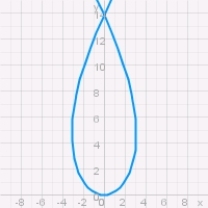
 .
. 

Unlock Deck
Unlock for access to all 71 flashcards in this deck.
Unlock Deck
k this deck
37
The length of the parametric curve  is which of the following?
is which of the following?
A)
B)
C)
D)
E)
The length integral cannot be computed analytically by the methods covered so far.
 is which of the following?
is which of the following? A)

B)

C)

D)

E)
The length integral cannot be computed analytically by the methods covered so far.

Unlock Deck
Unlock for access to all 71 flashcards in this deck.
Unlock Deck
k this deck
38
A particle travels along a path  (where time is measured in minutes and length in feet). Find the speed of the particle at
(where time is measured in minutes and length in feet). Find the speed of the particle at  , and compute the displacement and the distance traveled during the first
, and compute the displacement and the distance traveled during the first  min.
min.
 (where time is measured in minutes and length in feet). Find the speed of the particle at
(where time is measured in minutes and length in feet). Find the speed of the particle at  , and compute the displacement and the distance traveled during the first
, and compute the displacement and the distance traveled during the first  min.
min.
Unlock Deck
Unlock for access to all 71 flashcards in this deck.
Unlock Deck
k this deck
39
Match the polar equations with their Cartesian form
A)
B)
C)
D)
i)
ii)
iii)
iv)
A)

B)

C)

D)

i)

ii)

iii)

iv)


Unlock Deck
Unlock for access to all 71 flashcards in this deck.
Unlock Deck
k this deck
40
Match the polar equations with their Cartesian form
A)
B)
C)
D)
i)
ii)
iii)
iv)
A)

B)

C)

D)

i)

ii)

iii)

iv)


Unlock Deck
Unlock for access to all 71 flashcards in this deck.
Unlock Deck
k this deck
41
Suppose that  has polar coordinates
has polar coordinates  , where x and y are not both zero.
, where x and y are not both zero.
Find the polar coordinates of the following.
A)
B)
C)
D)
 has polar coordinates
has polar coordinates  , where x and y are not both zero.
, where x and y are not both zero.Find the polar coordinates of the following.
A)

B)

C)

D)


Unlock Deck
Unlock for access to all 71 flashcards in this deck.
Unlock Deck
k this deck
42
Find the area of the inner loop of  .
. 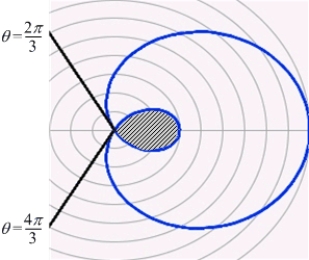
 .
. 

Unlock Deck
Unlock for access to all 71 flashcards in this deck.
Unlock Deck
k this deck
43
Give the polar coordinates of the point of intersection of the lines  and
and  .
.
 and
and  .
.
Unlock Deck
Unlock for access to all 71 flashcards in this deck.
Unlock Deck
k this deck
44
Convert the equation  to polar coordinates.
to polar coordinates.
 to polar coordinates.
to polar coordinates.
Unlock Deck
Unlock for access to all 71 flashcards in this deck.
Unlock Deck
k this deck
45
Consider the limaçon  .
. 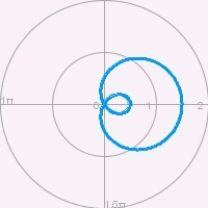
A) Express as functions of
as functions of  , and find
, and find  and
and  .
.
B) Find the slopes of the tangent lines to the inner loop of the limaçon at the origin.
 .
. 
A) Express
 as functions of
as functions of  , and find
, and find  and
and  .
. B) Find the slopes of the tangent lines to the inner loop of the limaçon at the origin.

Unlock Deck
Unlock for access to all 71 flashcards in this deck.
Unlock Deck
k this deck
46
Determine the area of the inner loop of  .
. 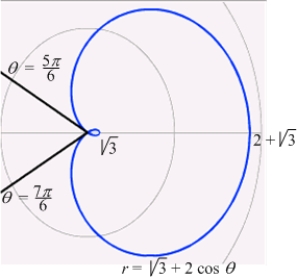
 .
. 

Unlock Deck
Unlock for access to all 71 flashcards in this deck.
Unlock Deck
k this deck
47
The Cartesian coordinates of the point on the polar curve  closest to the origin are:
closest to the origin are:
A) .
.
B) .
.
C) .
.
D) .
.
E) .
.
 closest to the origin are:
closest to the origin are:A)
 .
.B)
 .
.C)
 .
.D)
 .
.E)
 .
.
Unlock Deck
Unlock for access to all 71 flashcards in this deck.
Unlock Deck
k this deck
48
Find a parametrization for the curve  from
from  to
to  .
.
 from
from  to
to  .
.
Unlock Deck
Unlock for access to all 71 flashcards in this deck.
Unlock Deck
k this deck
49
Find the length of the polar curve  .
.
Use: .
.
 .
.Use:
 .
.
Unlock Deck
Unlock for access to all 71 flashcards in this deck.
Unlock Deck
k this deck
50
Find the polar equation of the line  .
.
 .
.
Unlock Deck
Unlock for access to all 71 flashcards in this deck.
Unlock Deck
k this deck
51
Find the area of the inner loop of  .
. 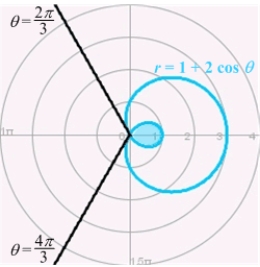
 .
. 

Unlock Deck
Unlock for access to all 71 flashcards in this deck.
Unlock Deck
k this deck
52
Find the area enclosed by the leaf of the four-leaved rose 
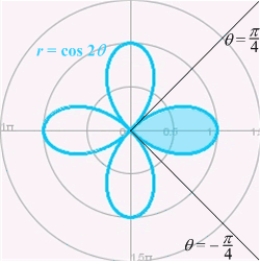



Unlock Deck
Unlock for access to all 71 flashcards in this deck.
Unlock Deck
k this deck
53
The exact value of the area that lies inside  and outside
and outside  is approximately which of the following?
is approximately which of the following? 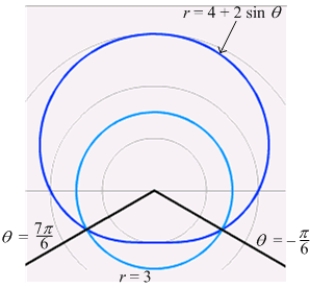
A) 36.03
B) 10.03
C) 16.3
D) 18.226
E) none of the above.
 and outside
and outside  is approximately which of the following?
is approximately which of the following? 
A) 36.03
B) 10.03
C) 16.3
D) 18.226
E) none of the above.

Unlock Deck
Unlock for access to all 71 flashcards in this deck.
Unlock Deck
k this deck
54
The area inside  and outside
and outside  is approximately which of the following?
is approximately which of the following? 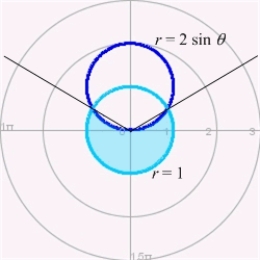
A) 1.571
B) 1.913
C) 1.228
D) 2.094
E) 4.188
 and outside
and outside  is approximately which of the following?
is approximately which of the following? 
A) 1.571
B) 1.913
C) 1.228
D) 2.094
E) 4.188

Unlock Deck
Unlock for access to all 71 flashcards in this deck.
Unlock Deck
k this deck
55
The area inside  but outside
but outside  is approximately which of the following?
is approximately which of the following? 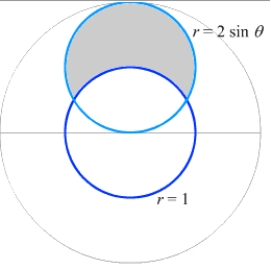
A) 1.571
B) 1.913
C) 1.228
D) 1.047
E) 0.956
 but outside
but outside  is approximately which of the following?
is approximately which of the following? 
A) 1.571
B) 1.913
C) 1.228
D) 1.047
E) 0.956

Unlock Deck
Unlock for access to all 71 flashcards in this deck.
Unlock Deck
k this deck
56
The equation of  in Cartesian coordinates is which of the following?
in Cartesian coordinates is which of the following?
A)
B)
C)
D)
E)
 in Cartesian coordinates is which of the following?
in Cartesian coordinates is which of the following?A)

B)

C)

D)

E)


Unlock Deck
Unlock for access to all 71 flashcards in this deck.
Unlock Deck
k this deck
57
The area that lies outside  and inside
and inside  is approximately which of the following?
is approximately which of the following? 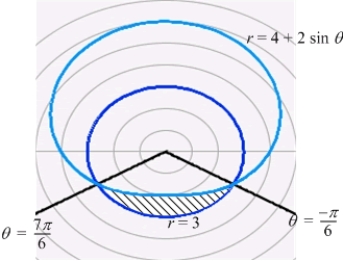
A) 36.03
B) 16.3
C) 3.57
D) 10.03
E) 9.11
 and inside
and inside  is approximately which of the following?
is approximately which of the following? 
A) 36.03
B) 16.3
C) 3.57
D) 10.03
E) 9.11

Unlock Deck
Unlock for access to all 71 flashcards in this deck.
Unlock Deck
k this deck
58
Find the area of the shaded region in the following figure. 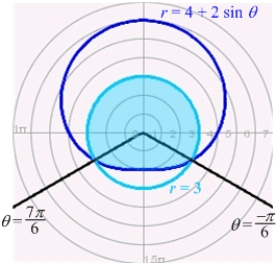


Unlock Deck
Unlock for access to all 71 flashcards in this deck.
Unlock Deck
k this deck
59
The area outside  but inside
but inside  is which of the following?
is which of the following? 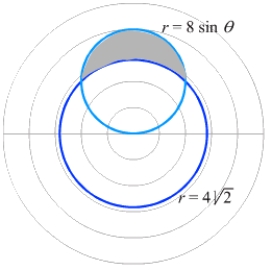
A)
B) 16
C)
D) 32
E) 8
 but inside
but inside  is which of the following?
is which of the following? 
A)

B) 16
C)

D) 32
E) 8

Unlock Deck
Unlock for access to all 71 flashcards in this deck.
Unlock Deck
k this deck
60
Find the length of the polar curve  .
.
 .
.
Unlock Deck
Unlock for access to all 71 flashcards in this deck.
Unlock Deck
k this deck
61
The part of the parabola  has a length of
has a length of  .
.
Find the focus and directrix of the parabola.
Use .
.
 has a length of
has a length of  .
.Find the focus and directrix of the parabola.
Use
 .
.
Unlock Deck
Unlock for access to all 71 flashcards in this deck.
Unlock Deck
k this deck
62
Consider the conic section  .
.
A) Identify the conic.
B) Find the foci, vertices, and eccentricity of the conic.
 .
. A) Identify the conic.
B) Find the foci, vertices, and eccentricity of the conic.

Unlock Deck
Unlock for access to all 71 flashcards in this deck.
Unlock Deck
k this deck
63
Determine the standard equation of the parabola whose focus is the point  and directrix is the line
and directrix is the line  .
.
 and directrix is the line
and directrix is the line  .
.
Unlock Deck
Unlock for access to all 71 flashcards in this deck.
Unlock Deck
k this deck
64
Write the standard equation for the ellipse with foci at  and
and  , and vertices at
, and vertices at  and
and  .
.
 and
and  , and vertices at
, and vertices at  and
and  .
.
Unlock Deck
Unlock for access to all 71 flashcards in this deck.
Unlock Deck
k this deck
65
Which of the following equations describes the graph of a hyperbola?
A)
B)
C)
D)
E) A and C
A)

B)

C)

D)

E) A and C

Unlock Deck
Unlock for access to all 71 flashcards in this deck.
Unlock Deck
k this deck
66
Write the standard equation for the ellipse with the following characteristics: center  , vertex
, vertex  , and focus
, and focus  .
.
 , vertex
, vertex  , and focus
, and focus  .
.
Unlock Deck
Unlock for access to all 71 flashcards in this deck.
Unlock Deck
k this deck
67
Find the area inside the cardioid  and below the line
and below the line 
 and below the line
and below the line 

Unlock Deck
Unlock for access to all 71 flashcards in this deck.
Unlock Deck
k this deck
68
Find the area enclosed by one turn of the logarithmic spiral  .
.
 .
.
Unlock Deck
Unlock for access to all 71 flashcards in this deck.
Unlock Deck
k this deck
69
Identify the type of conic section whose polar equation is  .
.
 .
.
Unlock Deck
Unlock for access to all 71 flashcards in this deck.
Unlock Deck
k this deck
70
The polar curve  is the equation of:
is the equation of:
A)
a circle.
B)
an ellipse.
C)
a parabola.
D)
a hyperbola.
E)
a line.
 is the equation of:
is the equation of: A)
a circle.
B)
an ellipse.
C)
a parabola.
D)
a hyperbola.
E)
a line.

Unlock Deck
Unlock for access to all 71 flashcards in this deck.
Unlock Deck
k this deck
71
Find the equation for the ellipse with foci at  and
and  and eccentricity
and eccentricity  .
.
 and
and  and eccentricity
and eccentricity  .
.
Unlock Deck
Unlock for access to all 71 flashcards in this deck.
Unlock Deck
k this deck


